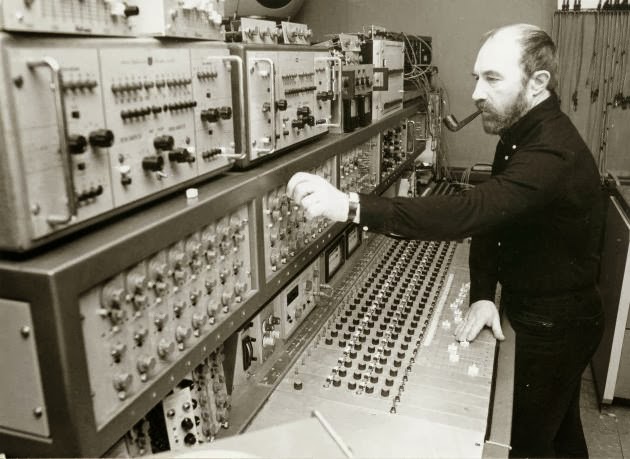Sound Narrative
Days available for students to work in WORM sound studio:
- 3 - 16 Feb
- 10 -16 March
Use the studio calendar to book your times http://pzwart3.wdka.hro.nl/wiki/Calendars:Worm_sound_studio
Into the sound studio
A hands-on introduction to the analogue sound studio.
Using WORM's sound Studio (AKA SEM/Klangdum), as a working space - as it possess much of the same equipment and protocols one would find in a usual sound studio -, during these four session you will get to know the studio and become confident about using it on your own.
We will go through the common equipment, procedures, and protocols, as well as this studio's own idiosyncrasies and gems - its synthesizers! We will also delve into the music historical contexts in which some of these technologies and practices developed, such as Jamaican Dub, post-war European Avant-garde, and US and UK pop.
These sessions are a follow-up of Stock's Sound and Narrative. You are invited to use the studio and its resources to expand your sonic pallet and compositional methods.
Session#1 Intro + Sound mixer + Stereo recording
16 Jan 15:00 - 19:00 @ The WdKA AV sound studio - BL 2.9b/c
http://www.stockhausen.org/new_photos/1991_wdr_studiojpg
Attitude in the studio with Stockhausen.
discography
- Pierre Schaeffer - Etude Aux Chemain de Fer
- Pierre Henry - Variations Pour Une Porte Et Un Soupir
videos
How shellac records are made (1942) http://www.youtube.com/watch?v=qZ5PQSaDYgU
bibliography
- Thom Holmes 2008 Electronic and Experimental Music: Technology, Music, and Culture
- A history of sound recording: http://www.auldworks.com/bbrec1.htm
- David Byrne 2012 How Music Works
- Francis Rumsey and Tim McCormick 2009 Sound and Recording - very technical
- Mark Katz 2010 Capturing Sound - On sound recording technology changing music, and the way we listen to it
articles on audio mixers
- http://www.performing-musician.com/pm/sep09/articles/technotes.htm
- http://www.performing-musician.com/pm/oct09/articles/technotes.htm
- http://www.performing-musician.com/pm/nov09/articles/technotes.htm
- http://www.performing-musician.com/pm/dec09/articles/technotes.htm
- http://www.performing-musician.com/pm/jan10/articles/technotes.htm
This first session will serve as an introduction to the sound studio and its central element - the mixing desk.
We will try to familiarize ourselves with the mixer, monitors, and the studio spaces and create a series of recording and set-ups, that will make us most of the mixer's features.

"No, no, I'm not hearing a thing, did you connect phonogene Pierre?" asks Pierre Schaeffer
Session #2 Sound mixer - Complex
30 Jan 14:00 - 18:00 - WORM
Continuing working with the mixer, we will look how multi-track sound allowed for a transformation of both the time and space of recoded sound. In the session we will use the mixer and external effect to achieve the spacial and temporal transformations of time.
Loose structure
- transformation of time
- splicing
- overdubbing
- transformation of space
- distance simulation
- stereo sound - virtual position
- echo and reverb
Towards the end of the session we will setting-up the mixer to accommodate with a dub multitrack session. With this setup in place you will be able to do a live re-composition of the original song, using the mixer as the central instrument, in a similar fashion dub producers started doing in the 1970s.
Discography
- Beatles - Strawberry Fields
- Scambi - Henri Pousseur - research project on the piece
- Steve Reich - It's Gonna Rain
- Beatles - Eleanor Rigby
- Mike Oldfield - Tubular Bells
- Bernard Parmegiani - Dedans-Dehors - 1977
- Jimi Hendrix - Crosstown Traffic
- Elvis Presley - Blue Moon
- King Tubby - Dub From The Roots

Bernard Parmegiani composing with the required pipe
Session #3 Analogue Synths - Basic

Wendy Carlos composing on her Moog
11 Feb 11:00 - 18:00
As WORM's studio is filled of vintage analog synths, we will look into the basic principals and components of analogue sound synthesis and use the synths available to tryout the basic techniques and experiment with other possible. We'll use mainly the (simpler) EMS Putney and the (more complex) ARP 2500, but there is a pleura of synths available for the curious and eager ones.
- Sound waves: parameters and types.
- Synthesis techniques: Additive and subtractive;
FM, Granular - Basic synthesizers' modules: Oscillators, Noise generators, LFOs, Filters, Envelopes, and amplifiers.
- Interconnect all these modules to produces a variety of sounds (on both the Putney, the ARP, and using the more conventional patch cord system).
- Modulations
Filmography
(add more if you find them)
Moog - on the Moog synthesizer: http://www.youtube.com/watch?v=y5HRa9nEVVU
What the Future Sounded Like http://www.youtube.com/watch?v=8KkW8Ul7Q1I
Éliane Radigue - IMA Portrait documentary - Eliane Radigue is a French composer, and synth pioneer who explored a lot drones and immersive sound; She used the big ARP2500 present in the sound studio. http://www.youtube.com/watch?v=D2U0q4lZiFg
Synth Britannia - 1980 British pop and the synthesizers - http://www.youtube.com/watch?v=1lVljmH0yUw
Bibliography
Trevor Pinch, Frank Trocco Analog Days: The Invention and Impact of the Moog Synthesizer. Harvard University Press - detailed retelling of the invention of the synthesizer, focusing both on Bob Moog and Don Buchla's journey into the creation of the synth.
Martin Russ Sound Synthesis And Sampling. Focal Press - Quite technical, but very complete
Mark Jenkins Analog Synthesizers: Understanding, Performing, Buying Focal Press - Another technical one
Session #4 Analogue Synths - Complex
13 Feb 14:00 - 18:00
- Envelopes
- Sequencers
- external controlling interfaces: keyboards, and MIDI devices (via MIDI to CV converter), to allow further expressivity with the synths.
- Experiment, experiment, experiment.
